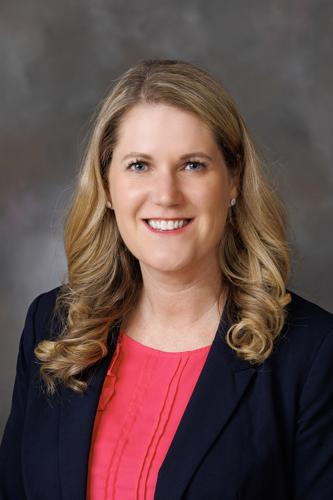After nearly four hours of debate across two days, Nebraska's Legislature gave first-round approval Thursday to a bill that would enhance penalties for drug dealers tied to overdoses��— and, critics said, contribute��to the overcrowding that plagues the state's prisons.
The Legislature ultimately voted 35-2 to advance the bill (LB137) after a small group of lawmakers spent hours Wednesday and Thursday urging their colleagues to oppose the measure championed by Sen. Carolyn Bosn of Lincoln, casting it as an overly broad and ineffective approach to respond to drug overdoses.

Bosn
If made law, the bill would increase the potential prison sentence dealers might face if drugs they're accused of distributing kill or seriously injure a drug user, allowing for a prison sentence of up to 50 years.
Omaha Sens. Justin Wayne and Terrell McKinney led a group of urban lawmakers��who repeatedly lined up to��speak out against Bosn's bill, which was initially introduced last year by former Sen. Suzanne Geist of Lincoln, whom Bosn replaced after Geist resigned from the Legislature��in April.
People are also reading…
Wayne repeatedly grilled Bosn, a former prosecutor, on the "overly broad" language in the proposal, which he suggested could be seized upon by prosecutors��to target defendants Bosn wasn't intending to crack down on.
After hours of debate Thursday morning, Wayne and Bosn agreed to add an amendment to the bill to make clear that the enhanced��penalties��could only be deployed against defendants who supplied drugs that "directly and proximately caused" the death or serious injury of a drug user.
The Legislature adopted Wayne's amendment on a 40-0 vote and, shortly after, voted to advance the bill from the first of three rounds of debate.

State Sen. Carolyn Bosn of Lincoln (facing) speaks with Sen. Jen Day of Omaha as at the state Capitol on Jan. 4. The Legislature gave first-round approval Thursday to Bosn's LB137 after nearly four hours of debate over two days.
McKinney and Sen. Machaela Cavanaugh of Omaha were the only two lawmakers to vote against the bill's advancement, while Wayne and others who had opposed the legislation��— including Sens. Danielle Conrad and George Dungan of Lincoln��— opted not to vote at all.
It had been clear since Wednesday morning that Bosn's bill had ample support to survive a potential filibuster��in Nebraska's formally nonpartisan, 49-member unicameral Legislature. And a bid to indefinitely postpone��the bill failed on a 36-8 vote halfway through Thursday's three-hour morning session.
But the group of urban lawmakers spent hours railing against the proposal anyway, pointing to prior penalty enhancements that have left Nebraska's prison system among the most overcrowded in the country.

Conrad
��
"Instead of learning those lessons from our sister states, we have before us efforts to double down on bad policy, to perpetuate��a war on drugs and to look tough on crime," Conrad said. "Enhanced penalties and additional penalties��don't get after the root of the problem."
Bosn, meanwhile, said the proposal was among a series of steps the Legislature could and should take this year to combat��drug overdoses, specifically those involving fentanyl and other synthetic opioids, between January 2018 and November 2022.
"We have a responsibility," she said. "This is our exact job. Picking license plates, doing all those things��— we do that, too. This is our obligation. This is why people send you here. This is why they vote. Respond to the crises that we're facing."
Bosn, too, questioned her colleagues over why opposition against her bill had "become partisan," particularly after the conservative-dominated Legislature had��advanced a bill in January that would give sterile needles to drug users to reduce the spread of infectious disease.
"This is a bill that every single person in here on both sides of the aisle should be saying, 'Heck yes. Let's attack this problem,'" she said. "I cannot think of another example where we have lost hundreds of children and people in our state and we have turned around and said, 'You know, we just��— we aren't the people to make that decision on how to fix that problem. We don't really want to get involved with that.'
"Hundreds of people are dying and we are sitting here saying, 'This might not be the solution that we need.'"
The bill's detractors��— all of whom are registered Democrats��—��insisted that their opposition stemmed not from their political party, but from genuine concerns with the potential impact of the legislation.
Cavanaugh said she was "displeased and offended" by Bosn's implication, calling penalty enhancements "bad policies" and warning her colleagues to "not start throwing mud at each other."

Cavanaugh
Wayne agreed with Bosn's assessment that lawmakers were sent to the Capitol to pass "sound bills," suggesting LB137 didn't qualify.
He noted that the case that prompted the proposal — the November 2021 overdose death of��Taryn Griffith,��a 24-year-old Sarpy County woman who died after unknowingly taking��a fentanyl-laced tablet at a Lincoln club — would not have ended any differently had Bosn's bill been law.
Sen. Barry DeKay of Niobrara read a letter amid Thursday's debate from Griffth's parents, who told lawmakers that the state "cannot continue to punish drug dealers and distributors with barely a slap on the wrist," calling for a mandatory minimum sentence and a change to how police handle overdose investigations.
Bosn's bill creates an enhancement with no mandatory minimum that can be added to felony drug delivery charges.
But the Lancaster County Attorney's Office never filed charges in��Griffith's overdose��— meaning there's no defendant to face the enhanced penalty created by the bill.
"We're reacting to a situation, but we're not actually addressing the situation that we're trying to react to," Wayne said. "We're creating a bill, a new enhancement penalty, that doesn't solve the problem of the individuals who brought the bill. If we're gonna pass legislation to fix problems, let's actually fix the problem."

Justin Wayne.
If the bill is made law, its passage would mark the Legislature's latest step to increase potential sentence lengths for criminal defendants in Nebraska.
An academic report released in January��blamed overcrowding in the state's prisons on lawmakers who, both broadly and incrementally, have increased minimum sentence lengths for a host of crimes over the past two decades, manufacturing the overcrowding crisis the state faces now.
Part of the prison population's increase passed by the Legislature in 2009 in response to an epidemic of gang violence in Omaha’s inner city.
The Legislature passed seven laws between 2015 and 2018 that brought increased penalties for pandering, prostitution, human or labor trafficking, assaulting police officers and sexually assaulting or sexually contacting students, in some cases making felonies out of former misdemeanors.
And lawmakers have created new offenses for threatening someone via text or email, distributing a private image of another person and grooming while defining health care officials as peace officers, making it a felony to strike them, too.
As his colleagues considered Bosn's bill Thursday, McKinney said it would ultimately add to the prison system's crowding problem, pointing to the measure's , in which the Department of Correctional Services said the bill "could increase the length of stay of persons in prison, thereby increasing the overall prison population."

McKinney
��
He questioned why the Legislature would advance a criminal penalty enhancement after the body created a sentencing reform task force last year.
"This is jumping the gun. But y'all don't care, because you've got the votes and you can do what you want," said McKinney, who said that he would resign from the sentencing task force if the Legislature passed Bosn's bill, minutes before 35 senators voted to advance it.
Download the new Journal Star News Mobile App
Top Journal Star photos for February 2024

Lincoln Southeast's Jake Hilkemann (center) is met by his teammates after making the game-winning shot in the Knights' A-5 district championship win against Creighton Prep on Monday in Omaha.

Sgt. Kurt Heideman��of of the Nebraska Army National Guard’s Company A, 2-134th Infantry Battalion is greeted by his children Rafe, 5, Zach, 10, Max, 9, and Maggie, 7, after returning from an overseas deployment in Africa at the Nebraska National Guard base on Thursday, Feb. 22, 2024.

Nebraska football's Emmett Johnson dunks over head coach Matt Rhule in the halftime dunk contest during halftime of the game against Minnesota on Sunday, Feb. 25, 2024, at Pinnacle Bank Arena.

A bicyclist passes underneath the P street bridge that runs over the Billy Wolff Trail as Lincolnites take advantage of a warm afternoon on Tuesday, Feb. 13, 2024, in Lincoln

Nebraska's Olivia Mauch dives during a beach volleyball match against Wayne State on Monday, Feb. 26, 2024, in Lincoln.

Millard West's Celia Hodge slices through the water as she completes a dive during the first day of Swim and Dive Championships at the Bob Devaney Sports Center, on Thursday, Feb. 22, 2024, in Lincoln.

Former Nebraska Sen. Chuck Hagel testifies Friday at the Capitol about a proposal for the state to adopt��the Veterans Justice Act.

Nebraska's Jaz Shelley (1) wipes a tear from her eye while being recognized during Senior Day after Saturday's victory over Minnesota at Pinnacle Bank Arena. Shelley had 16 points to lead the Huskers.

Lincoln East's Jadeon Carter reacts after winning the boys 200-yard freestyle at the state swimming championships on Saturday at the Devaney Sports Center.

the Lincoln Police Department and Lincoln Fire and Rescue respond to a crash at 52nd and O St., on Friday, Feb. 2, 2024.

Lincoln Southeast’s Nyaluak Dak (35) celebrates with her family (from left) Chudier Chuol, Nyalippe Dak and Nyawuol Dak after winning over Lincoln Pius X��in the A-6 district final on Friday at Pius X High School.

Lincoln Southwest's Samantha Neil swims in the 400-yard freestyle relay prelims during the girls state swimming championships on Friday, Feb. 23, 2024 at the Devaney Sports Center.

Aris Bertwell, 4 (left), and Cora West, 3, peer out from viewing holes in a jungle gym tunnel at Primrose Schools located inside the Hudl building.

Omaha Marian's Lucy Johansen, Meredith Peyton, and Easton Glandt (from left) celebrate after winning the Girls 200 Yard Freestyle Relay during the Swimming championship finals at the Bob Devaney Sports Center, on Saturday, Feb. 24, 2024, in Lincoln.

Lincoln High School SRO Ofc. Nolan Hauser stands in the hallway during a passing period to direct hallway traffic at Lincoln High School, on Thursday, Feb. 15, 2024.

Carsen McBride, 12, practices pitching with his dad as the sunsets on Thursday, Feb. 8, 2024 at Lewis Fields.

Lincoln Southeast's Natalya Woods leaps from the starting blocks alongside other swimmers in the Girls 50 Yard Freestyle final during the Swimming championship finals at the Bob Devaney Sports Center, on Saturday, Feb. 24, 2024, in Lincoln.

Gov. Jim Pillen (at podium) is joined by state senators as he announces the state will participate in the Summer Electronic Benefits Transfer Program after previously saying Nebraska wouldn't take part during a press conference in the Warner Chamber at the Capitol.

Scottsbluff's Chance Houser hugs his aunt Heather Cranmore (first left) and mother Chrissy Houser (right) while fans cheer him on after he defeated Lincoln Christian's Luke Farmen during the class B 126lb championship match at the CHI Health Center, on Saturday, Feb. 17, 2024, in Omaha.

North Platte's Tyler Haneborg, right, reacts after losing to Omaha Bryan's Abdirahman Unle during the Class A 113-pound championship match at the state wrestling tournament on Saturday, Feb. 17, 2024, at CHI Health Center Omaha.

Ignacia Hernandez, 90 (left), kisses her husband Chris, 95,while they are reflected in a mirror that hangs over photos from their time together at their home in south Lincoln, on Tuesday, Feb. 6, 2024. The couple is celebrating their celebrating their 75 years of marriage this February.

Lincoln Pius X's David Hatt (right) reads "Don Quixote" between dives in the first round during the first day of Swim and Dive Championships at the Bob Devaney Sports Center, on Thursday, Feb. 22, 2024, in Lincoln.

Stacy Griffin creates a Valentine's Day floral arrangement in her store Petal Creations on Tuesday. Griffin said she tells customers that "get-out-of-trouble flowers always cost more than the stay-out-of-trouble flowers."

Millard South's Hannah Kress leaps off the diving board during the first day of Swim and Dive Championships at the Bob Devaney Sports Center, on Thursday, Feb. 22, 2024, in Lincoln.

Valentine's Day quartet members Bob Lundberg (from left), Rick Pape, Jerry Neeman and William Sheldon sing love songs for Zach Millikan while he cuts a customer's hair at Straight Edge Barber Shop in Lincoln. The singers are members of the Lincoln Continentals, a men's barbershop chorus that divided into quartets on Wednesday and delivered singing valentines and boxes of chocolates around town.

Swimmers warmup during a break in the second day of the boys state swimming championships on Friday, Feb. 23, 2024, at the Bob Devaney Sports Center.

A Lincoln Lutheran student exits through aside door before the start of school at Lincoln Lutheran, on Wednesday, Feb. 14, 2024, in Lincoln. Students who are in the Acts of Random Kindness club made paper flowers to hand out to other students for Valentine’s Day.

South Sioux City's Tony Palmer reacts after defeating Elkhorn's Mason Villwok during the class B 215lb championship matchat the CHI Health Center, on Saturday, Feb. 17, 2024, in Omaha.

Waverly's Drew Moser (left) blows a kiss to the crowd as he celebrates pinning Beatrice's Merrick Johnson (right) during the class B 175lb championship matchat the CHI Health Center, on Saturday, Feb. 17, 2024, in Omaha.

Lincoln Pius X assistant coach JJ Clark (left) celebrates after Joe Andreasen won his Class A 175-pound championship match at the state wrestling tournament Saturday at CHI Health Center Omaha.

Members of the "What the Cluck" team wear inflatable chicken costumes to participate in the Polar Plunge event at Holmes Lake on Saturday.

University of Nebraska-Lincoln sociology junior Shyionna Thatcher (from left) and nutrition and health sciences junior Madison Marten throw confetti into the air after Nebraska scored its first points against Penn State on Saturday, Feb. 17, 2024, at Pinnacle Bank Arena.

Lincoln Christian's Luke Farmen (left) wrestles Bennington's Brayden Kreikemeier during a Class B 126-pound quarterfinal match at the state wrestling tournament on Thursday at CHI Health Center Omaha.

Students in the Acts of Random Kindness club work on making paper flowers to hand out before the start of school at Lincoln Lutheran, on Wednesday, Feb. 14, 2024, in Lincoln. Students who are in the Acts of Random Kindness club made paper flowers to hand out to other students for Valentine’s Day.

Bishop Neumann's Connor Schutt (52) dunks during the game against Ashland-Greenwood on Tuesday, Feb. 13, 2024, at Bishop Neumann.

Lincoln East senior Cassidy Bell helped write a bill, introduced by Lincoln Sen. Danielle Conrad this legislative session, that would require all schools to provide free menstrual products in their restrooms.

Nebraska's Natalie Potts (22) and Nebraska's Kendall Moriarty (15) chase after a loose ball during the second half of the game against Iowa on Sunday, Feb. 11, 2024, at Pinnacle Bank Arena.

Nebraska's Kendall Coley, center, cries while celebrating with her team after winning over Iowa on Sunday, Feb. 11, 2024, at Pinnacle Bank Arena. Nebraska won 82-79.

Nebraska's Sam Hoiberg (1) is fouled by Michigan’s Will Tschetter (42) during the second half of the game on Saturday, Feb. 10, 2024, at Pinnacle Bank Arena.

Nebraska's Peyton Robb waits for a challenge call to be reviewed at the end of his 157-pound match against Michigan on��Friday at the Devaney Sports Center.

Meadow Lane Elementary fifth graders Ava Schilousky (from left), Dani Thompson and Aurora Cordova react as their Dash robot knocks over the final bowling pin in their test course at Meadow Lane Elementary School.

Adelyn Baxter, 3, watches videos on a phone while her mother, Rachel Baxter, sets up a display for the 52nd annual Nebraska Builders Home & Garden Show at the Sandhills Global Event Center on Thursday. The show features ideas for landscaping, decorating, remodeling and building a new home. It runs 1-9 p.m. Friday, 10 a.m. to 8 p.m. Saturday, and 10 a.m. to 3 p.m. Sunday. Adult admission is $10 or $8 with a non-perishable food item for the Lincoln Food Bank.

Members of Ferocious Jungle Cat, Myles Jasnowaki (from left), Ian Fleming, Will Harman, Jack Rodenburg and Mike Masin, perform during the first night of the Lincoln Exposed music festival at the Zoo Bar.

Jaci Bunting, 12, smiles as her mom Sara helps hold her volleyball jersey for Nebraska's Lexi Rodriguez to sign during a National Girls and Women in Sports Day event on Wednesday at Hawks Championship Center.

Belmont Community Scholar Jaleah Loudermilk (right) leads her fellow scholars in raising their fists as they finish a rewritten speech from the book "Justice is ..." during the African American Read-In held at the LPS District Office on Wednesday.

Customers are reflected by a refrigerator door held open by Nash Leef, a farmer at the Salt Creek Farmers' Cooperative, as he looks for groceries during the opening of Open Harvest Co-op Grocery on Wednesday, Feb. 7, 2024.

Walkers are obscured by a thick fog on a path on top of the dam at Holmes Lake on Monday. Dense fog enveloped most of Lincoln Monday morning but later cleared up, bringing sun and temperatures in the upper 40s Monday afternoon. It will be even warmer the rest of the week, with forecast highs in the 50s Tuesday and Friday and the 60s Wednesday and Thursday, although those days will also bring high winds and a chance of rain. Temperatures are forecast to fall back into the 40s for the weekend, and there is a slight chance of some light snow.

Lincoln East senior Hannah Tang has been selected to represent Nebraska at the 62nd annual United States Senate Youth Program, Tang poses for a portrait at Lincoln East High School, on Monday, Feb. 5, 2024.

Nebraska's Antrell Taylor wrestles against Illinois' Chris Moore during the 165lb match on Sunday, Feb. 4, 2024 at the Bob Devaney Sports Center.

Lincoln's Kai Janviriya celebrates his goal in the final seconds of the second period with Dashel Oliver (24), Jared Mangan (center) and Jack Pechar (21) against Omaha on Saturday at the Ice Box.

Nebraska's Alexis Markowski (40) tips a rebound out of the grasp of Rutgers' Mya Petticord (3) and Chyna Cornwell (54) during the second half at Pinnacle Bank Arena, on Saturday, Feb. 3, 2024.

Lincoln Pius X's Sidda Hagedorn (from left), Natalie Prichard (12), Ava Markowski (40), Brynn Sebek (20) and Ellie Wells (52) celebrate after winning the game against Lincoln North Star��on Friday at North Star High School.

Lincoln Pius X's Amudi Musa lifts Raymond Central's Remington Parham during their 132-pound match Friday at Norris High School.

A student walks along the sidewalk in front of the Acklie Hall of Science (left) and the First United Methodist Church (right) on the Nebraska Wesleyan University campus in Lincoln.

Nebraska's Natalie Potts (22) and Northwestern's Melannie Daley (21) vie after a loose ball in the first at Pinnacle Bank Arena , on Tuesday, Feb. 20, 2024, in Lincoln.

Bob Brandt sets down Unadilla Billie, the town's newest taxidermic groundhog, in the middle of the street to see if she casts a shadow outside the town community center during a small gathering in Downtown Unadilla on Friday. Billie did not cast a shadow, which means an early spring. Nationally, live groundhog Punxsutawney Phil also predicted an early spring. People in Lincoln and southeast Nebraska have already been experiencing a very early spring, with temperatures on Friday reaching into the 60s for the third day in a row. The forecast calls for temperatures that are somewhat cooler but still well above average. The National Weather Service is forecasting a high in the low 50s on Saturday, around 50 on Sunday and then 50s and maybe even more 60s next week. There also is a 50% chance of rain on both Saturday and Sunday.

Nebraska fans storm the court after the game against Wisconsin on Thursday at Pinnacle Bank Arena. Nebraska won 80-72 in overtime.

Nebraska players run on to the court before the game against Purdue��on Wednesday at Pinnacle Bank Arena.




















